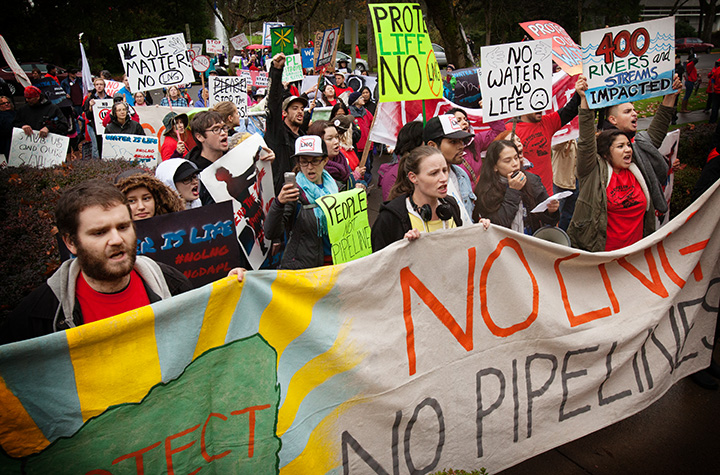This case study was written by Lesley Adams of Waterkeeper Alliance for our latest bank report card, Banking on Climate Change: Fossil Fuel Finance Report Card 2018.
 2017 Rally at the Department of State Lands, Salem, OR. PHOTO: Rick Rappaport / Waterkeeper Alliance
2017 Rally at the Department of State Lands, Salem, OR. PHOTO: Rick Rappaport / Waterkeeper Alliance
Southwest Oregon is home to rugged mountains, wild salmon, biologically diverse forests and strong communities that value Indigenous sovereignty and property rights. All of this is threatened by a Canadian company that wants to build a fracked gas pipeline through farms, ranches, and tribal lands to a proposed LNG export terminal in Coos Bay.
Calgary-based Pembina Pipeline is targeting Coos Bay, Oregon for the Jordan Cove LNG export terminal and the Pacific Connector Gas Pipeline, a 229-mile project that would for the first time connect fracked-gas pipelines in the U.S. and Canadian Rockies to the U.S. West Coast for export.1
This proposal has been in the works for more than a decade. After many years of local and regional opposition, federal regulators denied the project in 2016. However, the company re-applied in early 2017, obviously hoping for a more favorable reaction from the pro-fossil Trump Administration. A new Draft Environmental Impact Statement is expected sometime in 2018.2
The pipeline would slash through hundreds of fish-bearing streams and old-growth forest reserves on public lands. Dozens of animals and plants listed under the Endangered Species Act are threatened by this proposal, including iconic coho salmon. The pipeline would have to cross steep mountainous terrain that poses excessive landslide risks, while the terminal is proposed in an area at-risk of severe earthquake and tsunami damage. For decades, families have relied on fishing, clamming and oyster farming in Coos Bay, all of which would be harmed by the largest dredging project in state history.3
The Jordan Cove facility would also be a substantial source of climate pollution. A 2018 report from Oil Change International estimated that the total annual greenhouse gas emissions would be 37 million metric tons, which is more than 15 times the 2016 emissions of Oregon’s last remaining coal-fired power plant, which is scheduled to close in 2020.4
Hundreds of landowners are threatened with eminent domain if they don’t accept a small, one-time payment to forever alter their land,5 as well as the risks of accidental explosions and forest fires.6 The Klamath Tribes, the Yurok, and the Karuk have all come out in strong opposition to the proposed project,7 and multiple tribes have filed as intervenors in the federal regulatory process.8
| “The route of the LNG pipeline…shows it going through areas where villages once existed and it may unearth human remains… The route also would go under the Klamath River and the Rogue River, which since time immemorial have been and continue to be important sources of fish for Tribal members…The losses of our cultural resources and risks presented by the Project clearly outweigh any benefits to the public from building the LNG pipeline and the Jordan Cove terminal.”
– Donald Gentry, Chairman, Klamath Tribes, in letter to federal regulators, 9/21/169 |
This proposed project has forged effective alliances between unlikely partners. One Coos Bay resident wrote, “I’m a lifelong union electrician and a Republican, and I did not vote for U.S. Senator Jeff Merkley. But… I agree with Sen. Merkley that there is a better way to create jobs and strengthen our economy in Southern Oregon than to let a Canadian company put a 229-mile fracked gas pipeline across our land along with an extremely hazardous LNG terminal in an earthquake and tsunami zone here in Coos Bay.”10
Banks financing the companies constructing this project share responsibility for the impacts. Top bankers of Veresen, the original proponent of Jordan Cove, and now Pembina, which bought Veresen in 2017, include RBC, Scotiabank, CIBC, TD, and JPMorgan Chase.11
As global energy markets evolve dramatically with the transition to renewable energy, the Jordan Cove LNG export terminal looks increasingly at risk of becoming a stranded asset. Moreover, the egregious potential impacts and intense community opposition should steer banks away from further involvement in this project.
To learn more about Jordan Cove and how to stop it, visit http://www.nolngexports.org/.
1. Phil Castle, “Agreements Bode Well for Project Linking West Slope Gas to Asian Markets,” The Business Times, 14 November 2017.
2. “Jordan Cove LNG and Pacific Connector Pipeline Greenhouse Gas Emissions Briefing,” Oil Change International, January 2018.
3. “[Comments to] Federal Energy Regulatory Commission, in the Matters of Jordan Cove Energy Project, L.P. and Pacific Connector Gas Pipeline, L.P.,” Docket CP13-483-000 and Docket CP13-492-000, various organizations, November 2014.
4. “Jordan Cove LNG and Pacific Connector Pipeline Greenhouse Gas Emissions Briefing,” Oil Change International, January 2018.
5. Senator Jeff Merkley, Guest Opinion: We Can Create Infrastructure Jobs Without Jeopardizing Our Future,” Mail Tribune, 7 December 2017
6. “[Comments to] Federal Energy Regulatory Commission, in the Matters of Jordan Cove Energy Project, L.P. and Pacific Connector Gas Pipeline, L.P.,” Docket CP13-483-000 and Docket CP13-492-000, various organizations, November 2014.
7. Dan Bacher, “L“Karuk, Yurok and Klamath Tribes Oppose Pacific Connector Pipeline,” The Daily Kos, 14 November 2016
8. “Motion to Intervene in Jordan Cove Energy Project,” Confederated Tribes of Coos, Lower Umpqua, & Siuslaw Indians, FERC, 20 June 2013; “Motion to Intervene by Karuk Tribe in FERC Dockets CP17-494-000 (Pacific Connector Gas Pipeline) and CP17-495-000 (Jordan Cove Energy Project),” Karuk Tribe, FERC, 25 October 2017.
9. Donald C. Gentry, “Letter Re: OEP/DG2E/Gas Branch 3, Jordan Cove Energy Project LP, Docket No. CP13-483-000, Pacific Connector Gas Pipeline LP, Docket CP13-492-000,” The Klamath Tribes Tribal Council, 21 September 2016.
10. Bill McCaffree,“Guest Opinion: Why This Republican Agrees with Merkley,” Mail Tribune, 29 December 2017.
11. Research on lenders and underwriters for Veresen and Pembina via Bloomberg Finance L.P., updated October 2017.













